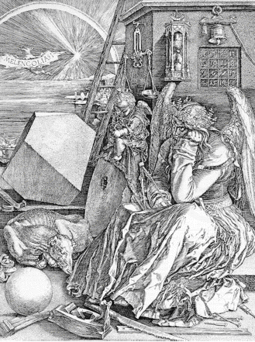Melancholia
|
|
Melancholia (Greek μελαγχολια) was described as a distinct disease as early as the fifth and fourth centuries BC in the Hippocratic writings. It was characterized by "aversion to food, despondency, sleeplessness, irritability, restlessness," as well as the statement that "Grief and fear, when lingering, provoke melancholia". It is now generally believed that melancholia was the same phenomenon as what is now called clinical depression.

The name melancholia comes from the old medical theory of the four humours: disease being caused by an imbalance in one or other of the four basic bodily fluids, or humours. Personality types were similarly determined by the dominant humour in a particular person. Melancholia was caused by an excess of black bile; hence the name, which means 'black bile' (Greek μελας, melas, "black", + χολη, kholé, "bile"); a person whose constitution tended to have a preponderance of black bile had a melancholic disposition. See also: sanguine, phlegmatic, choleric.
During the early 17th century, a curious cultural and literary cult of melancholia arose in England. It was believed that the passing of the dazzling culture of Elizabethan England after the death of Queen Elizabeth I, together with religious uncertainties caused by the English Reformation and a greater attention being paid to issues of sin, damnation, and salvation, led to this cultural mood.
In music, the post-Elizabethan cult of melancholia is associated with John Dowland, whose motto was Semper Dowland, semper dolens. ("Always Dowland, always mourning.") The melancholy man, known to contemporaries as a "malcontent," is epitomized by Shakespeare's Prince Hamlet, the "Melancholy Dane." Another literary expression of this cultural mood comes from the death-obsessed later works of John Donne. Other major melancholic authors include Sir Thomas Browne, and Jeremy Taylor, whose Hydriotaphia, Urn Burial and Holy Living and Holy Dying, respectively, contain extensive meditations on death. But the most extended treatment of the cult of melancholia comes from Robert Burton, whose Anatomy of Melancholy treats the subject from both a literary and a medical perspective.
A famous allegorical engraving by Albrecht Dürer is entitled Melancholia I; amongst other allegorical symbols, it includes a magic square, and a truncated cube. The image in turn inspired a sonnet by Edward Dowden.
A similar phenomenon, though not under the same name, occurred during Romanticism, with such works as The Sorrows of Young Werther by Goethe.
In the 20th century, much of the counterculture of modernism was fueled by comparable alienation and a sense of purposelessness called "anomie."
External links
- Grunwald Center website: Durer's Melencolia and clinical depression, iconography and printmaking techniques (http://www2.hammer.ucla.edu/etc/durer/)
- "Dürer's Melancholia": sonnet by Edward Dowden (http://www.theotherpages.org/poems/2000/d/dowden53.html)
